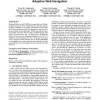Free Online Productivity Tools
i2Speak
i2Symbol
i2OCR
iTex2Img
iWeb2Print
iWeb2Shot
i2Type
iPdf2Split
iPdf2Merge
i2Bopomofo
i2Arabic
i2Style
i2Image
i2PDF
iLatex2Rtf
Sci2ools
132
click to vote
KDD
2002
ACM
2002
ACM
Relational Markov models and their application to adaptive web navigation
Relational Markov models (RMMs) are a generalization of Markov models where states can be of different types, with each type described by a different set of variables. The domain of each variable can be hierarchically structured, and shrinkage is carried out over the cross product of these hierarchies. RMMs make effective learning possible in domains with very large and heterogeneous state spaces, given only sparse data. We apply them to modeling the behavior of web site users, improving prediction in our PROTEUS architecture for personalizing web sites. We present experiments on an e-commerce and an academic web site showing that RMMs are substantially more accurate than alternative methods, and make good predictions even when applied to previously-unvisited parts of the site. Categories and Subject Descriptors H.2.8 [Database Management]: Database Applications--data mining; I.2.6 [Artificial Intelligence]: Learning--induction; I.5.1 [Pattern Recognition]: Models--statistical Keyword...
Data Mining | KDD 2002 | Keywords Markov Models | Relational Markov Models | Relational Probabilistic Models |
Related Content
| Added | 30 Nov 2009 |
| Updated | 30 Nov 2009 |
| Type | Conference |
| Year | 2002 |
| Where | KDD |
| Authors | Corin R. Anderson, Pedro Domingos, Daniel S. Weld |
Comments (0)

